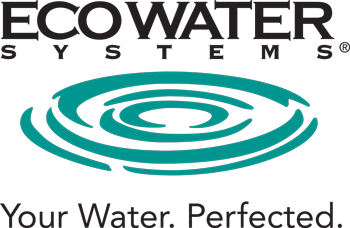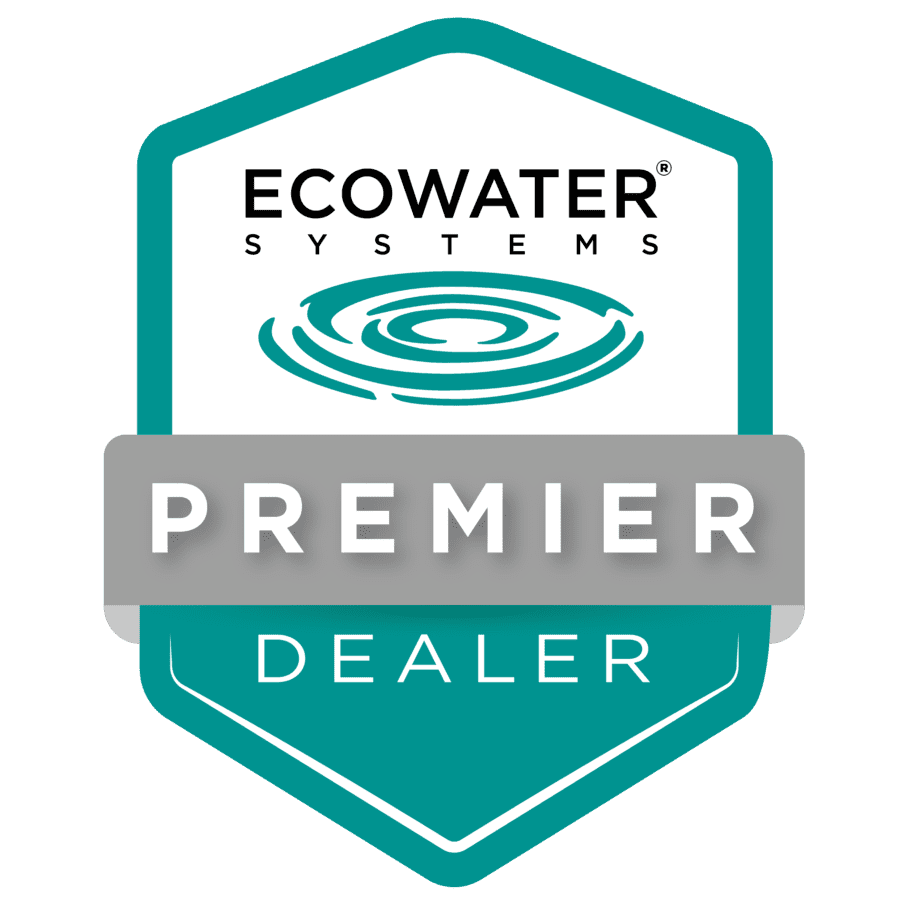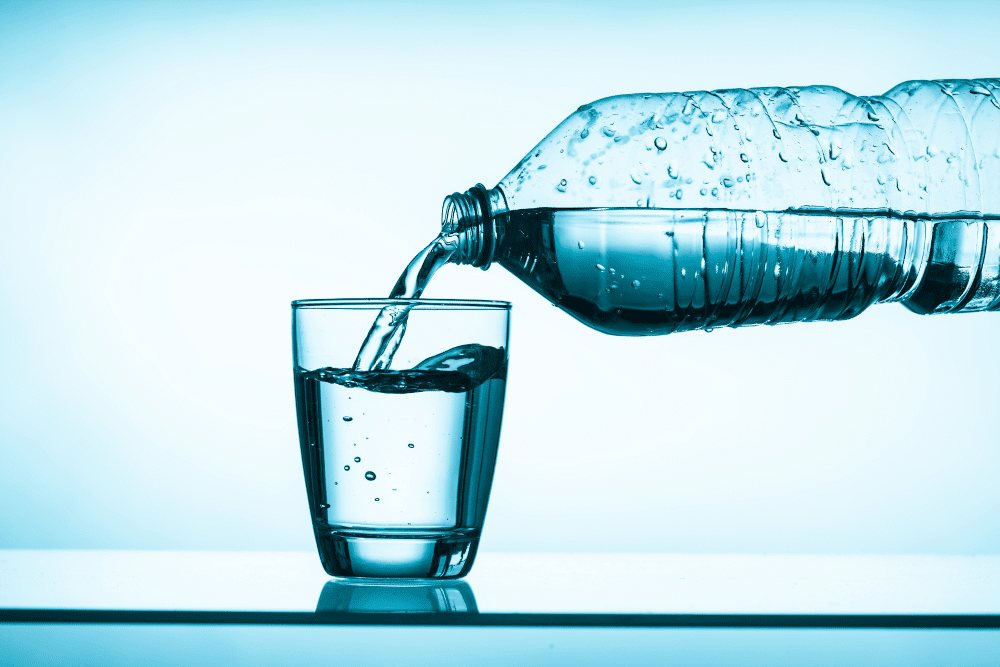Great question! If you’ve ever thought about what’s in the Winchester area water you might have also wondered what’s in the bottled water at the store and what are the best bottled water brands to drink.
Let’s talk about the reasons behind drinking bottled water vs the water you already have at home and then dig into things to look for when purchasing the best bottled water brands and alternative options you may not have considered before.
BOTTLED WATER VS. TAP WATER
Most of us in the United States have running water in our homes. We’ve grown up bathing in it, cleaning with it, drinking it, cooking with it, washing our clothes and dishes with it, etc. without giving it another thought. We know the water goes to a water treatment plant (if you’re on city water) to make our water “safe” and then back to our homes to use.
TYPES OF TAP WATER

CITY WATER
If you’re on city water, the water treatment plant takes out all of the harsh chemicals and minerals we shouldn’t consume, right? We hate to break it to you, but that’s not necessarily the case.
Water treatment plants are only required to test the water for certain types of contaminants and minerals and control the levels of those contaminants to a certain extent. They also add some chemicals back to the water – sometimes fluoride (to help reduce tooth decay), coagulation, and flocculation (to trap impurities).
After they’ve taken things out and added things back in, the water is then held in a storage tank or underground aquifer where it waits to travel through miles of piping, finally arriving at your place of residency. Can you imagine how old some of the pipes are leading back to your house? The cracks in the pipes and rust allow minerals and contaminants to get right back in your water stream on the way back to your house. Yikes!

SO WHAT ABOUT WELL WATER? THAT’S JUST WATER, RIGHT?
Water from a well isn’t always the safest water to drink either. Just like city water, contaminants, heavy metals, and harsh/natural minerals can also come into the well water supply. That’s why it’s always a good idea to get your well water tested (and you can have that done for free!). Well water can be unpredictable and what’s in it can change from day to day.

WATER PROBLEMS
A lot of people know their water isn’t safe to drink. That may be why you’re reading this article in the first place. Maybe you have orange or brown-tinged water, bad tasting water/bitter taste (or it just doesn’t have the smooth or crisp taste you prefer), water that dries out your skin or makes it itchy, or maybe your water smells bad and you’re trying to find a solution. Keep in mind that water should look like nothing, taste like nothing, and smell like nothing. So if the water at home is not safe to consume, what are my options, you ask?
First, let’s dive in deeper with bottled waters and talk about determining factors in finding the best bottled water brands and then let’s talk about water filters and reverse osmosis systems, so you can consider all of your options.
BOTTLED WATER BRANDS
At your local bottled water supplier (ie. gas stations and grocery stores), you can usually find a pretty wide variety of bottled waters to choose from including Evian, Mountain Valley Spring Water, Fiji Natural Artesian Water (Fiji Water), Ice Mountain, Deer Park Natural Spring Water, Mountain Valley, & Pure Life Purified Water. Some of them are naturally filtered (running over volcanic rock, lava rock, or “ancient rock”) and some of them are purified, while others are just spring water. What’s the difference?
MAKE SURE YOU READ THE LABELS
While some people claim that bottled water flat out provides better-tasting water, a blind taste test can show that at home RO water can taste just as good, if not better (and without all the contaminants and plastic that typically come with bottled water brands). Make sure you’re not just grabbing whatever label looks best. You need to know the contents of your water and check out all of the specifications.
TYPES OF BOTTLED WATERS

FILTERED NATURALLY/PURIFIED NATURALLY
Naturally filtered water can mean a variety of things but typically involves the water running over some sort of volcanic rock. While volcanic purified water can remove some contaminants, it’s still ground water that hasn’t been fully filtered. Some of these water bottle brands include Waiakea Hawaiian and 420 Volcanic.
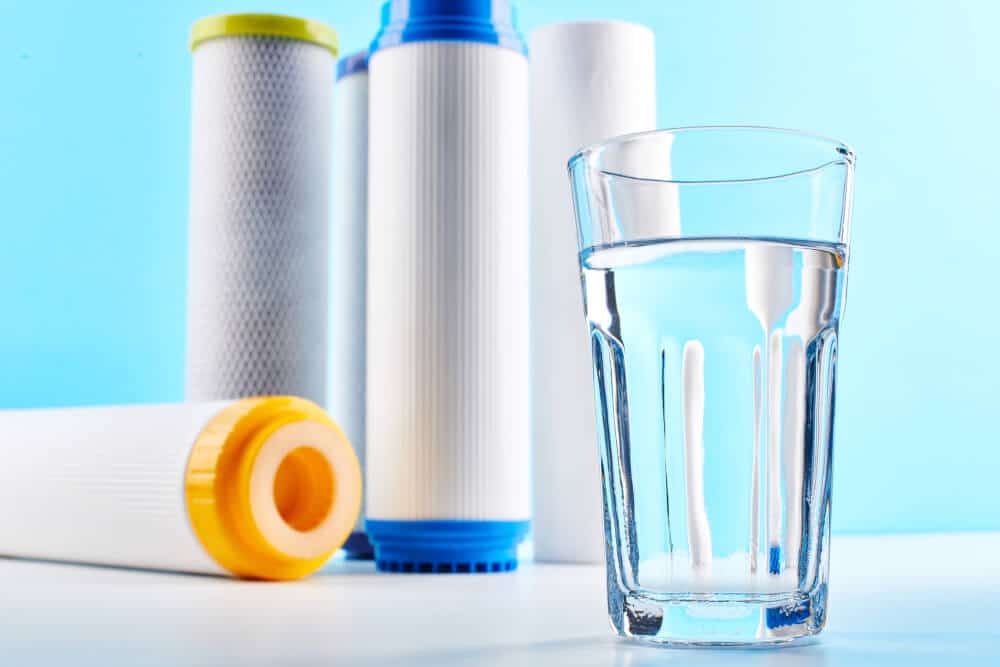
FILTERED WATER
Filtering water does not remove all of the contaminants that may be present, though a water filter can reduce the amount of sediment and contaminants in the water via a water filtration process. It also cannot completely remove chemicals such as fluoride or chlorine without a drinking water system. Simply put, it doesn’t necessarily make water safe enough to drink, even though it tends to make our conscience feel better about drinking it.
Dasani is a well-known brand of filtered bottled water brand. The U.K. removed Dasani from all of the stores in its country, because of the amount of bromate found in their bottled water. Bromate is known to increase cancer risk. Now, Dasani claims to use reverse osmosis for their water with minerals added to it for taste.

PURIFIED WATER
Purified water by definition is water that has been mechanically filtered to remove impurities and make it suitable for use. Suitable for use is the key phrase here and can mean a variety of things to different brands with different marketing goals. It doesn’t necessarily mean that all impurities have been filtered out, it just means they filtered out whichever impurities they wanted to filter out.
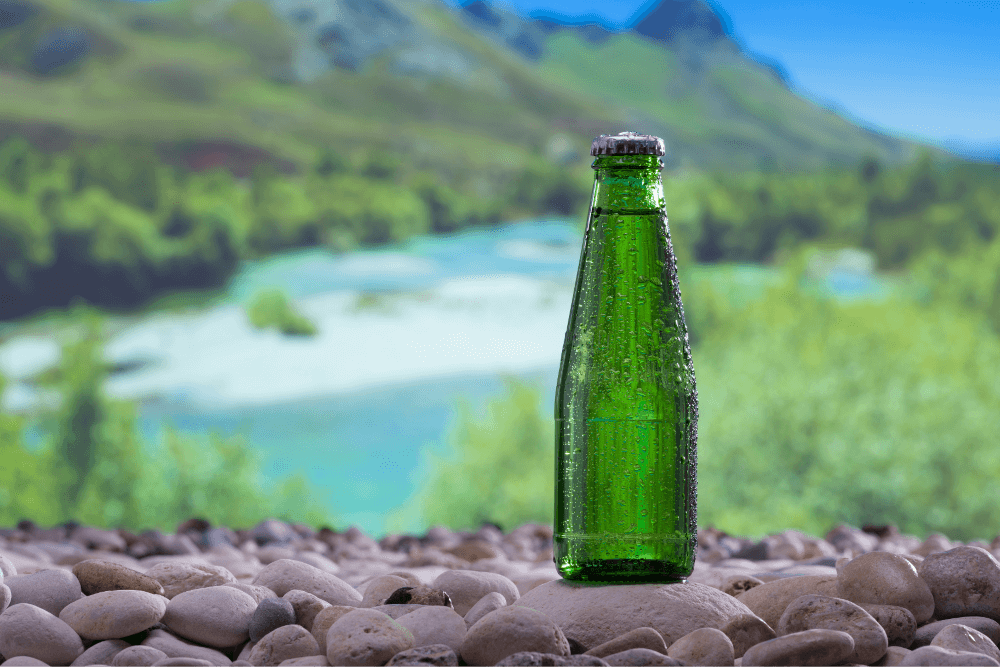
MINERAL WATER/ NATURALLY OCCURRING MINERALS/ NATURALLY CARBONATED WATER
Mineral water is water from a mineral spring that contains various minerals, such as salts and sulfur compounds. Mineral water may be still or naturally carbonated. People who prefer mineral water typically do so because of the mineral flavor the water lends and the healthy minerals people tend to believe purified water to be void of.

IONIZED ALKALINE WATER/ NATURALLY ALKALINE SPRING WATER
Naturally Alkaline Spring Water from brands such as “Eternal Alkaline Natural Spring Water” and “Flow Alkaline Spring Water” naturally has the pH of alkaline water because it’s been exposed to rock with certain mineral profiles in them. Ionized Alkaline water that has been mechanically treated is most often water that’s been exposed to a post-filter media that introduces minerals back into the water.
Both can be good types of water but both do not guarantee that all contaminants have been removed from the water. And, while many may claim that alkaline water has health benefits, the research says otherwise and classifies alkaline water as a neutral source of health & nutrition benefits.
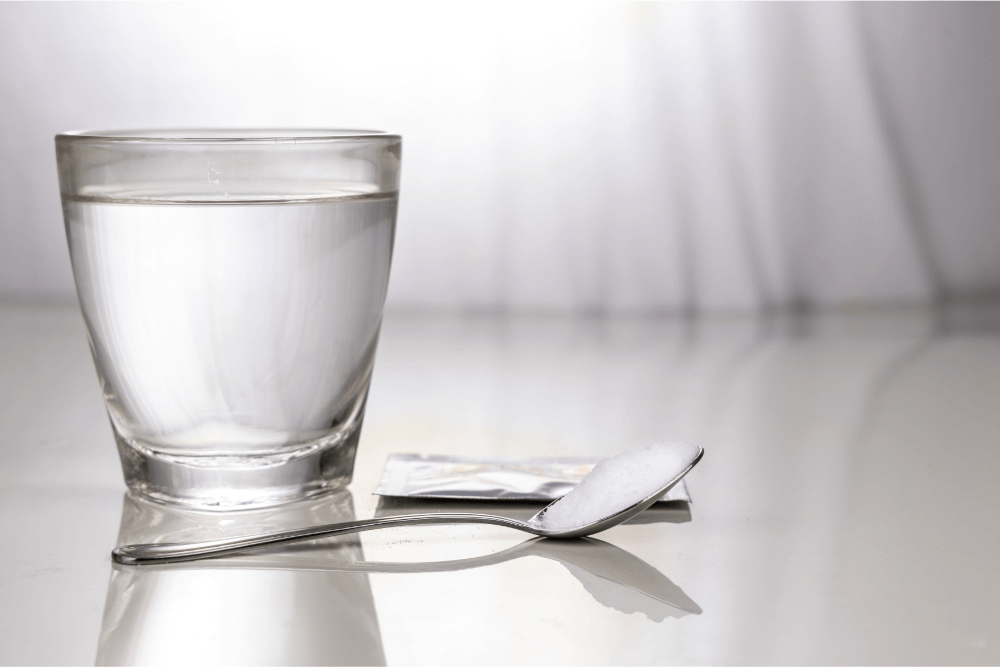
NATURAL ELECTROLYTES/ADDED ELECTROLYTES
Naturally occurring electrolytes are found in foods that contain minerals such as calcium, potassium chloride, magnesium sulfate, sodium bicarbonate, phosphate, & magnesium. Added electrolytes come are usually from minerals come in some sort of powder form. You can add electrolytes in your own home simply by adding a pinch of salt.
Electrolytes become positively or negatively charged when they enter your bloodstream. Once charged, they can conduct electricity (move electrical charges/signals throughout your body). These electrical charges are critical to the operation of many parts and functions of the body.
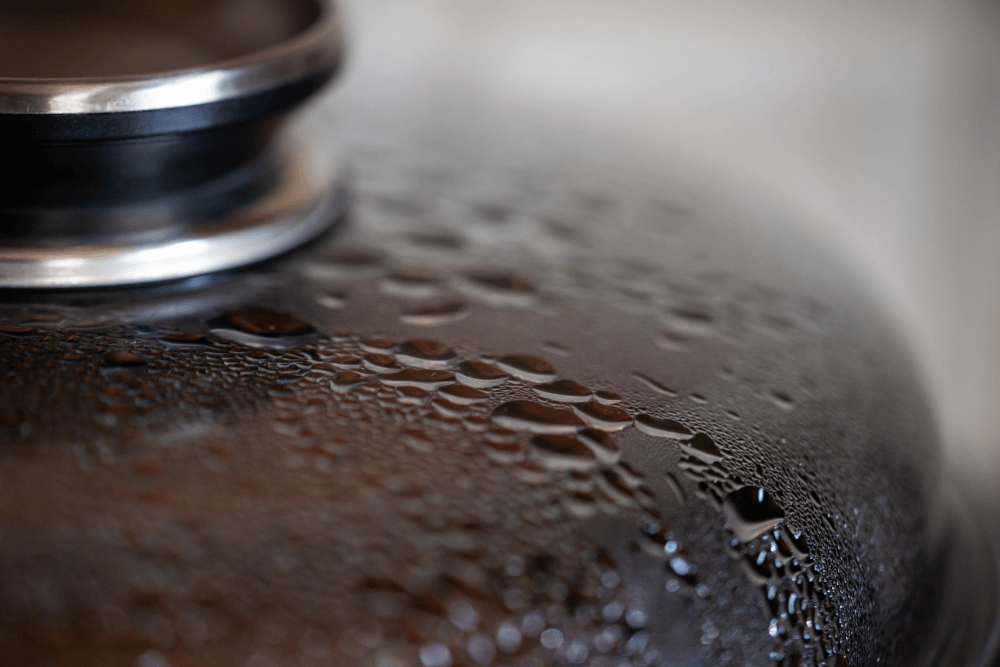
VAPOR DISTILLED WATER
Vapor distilled water is a specific type of purified water that is created using a specialized heating process. The water is purified of extra molecules and particulates and is considered one of the “cleanest” forms of water. However, vapor-distilled water does not occur naturally and can only be created by a lab.
While distilled water may be good for running mechanical items in your home, due to its lack of a mineral profile, it is not the best water for human consumption – at least not as your only water source. An example of a distilled water brand is Poland Spring.

SPARKLING WATER
Sparkling water, or carbonated water, is water infused with carbon dioxide gas under pressure. This produces the popular bubbly base for sparkling water, club soda, soda water, seltzer water, and fizzy water.
For people who like to drink soft drinks or alcohol and are trying to curb their bad habits, sparkling water is a great option. And the good news is, while it may feel drier in your mouth, it is not less hydrating than any other water, despite the myths that carbonation dehydrates you.

FLAVORED WATER
Flavored water comes in a slew of different profiles. Some are heavy with sugar and artificial flavor while others have zero sugar and just a hint of flavor. Most of these waters start with a tap water base with no contamination removal claims and focus solely on what’s been added. One such popular brand of flavored water is Hint bottled water.

REVERSE OSMOSIS WATER
Reverse Osmosis (RO) water uses semi-permeable membranes to reject dissolved solids (and other contaminants) as well as multiple stages of water filtration to reduce contaminants, eliminate odors, and improve water tastes.
RO water can remove up to 99% of dissolved solids and harmful contaminants found in the water supply. This is how bad water can become clean from things like fluoride, chlorine, e. coli, pesticides, PFAS, etc. Its job is to remove everything from the water.
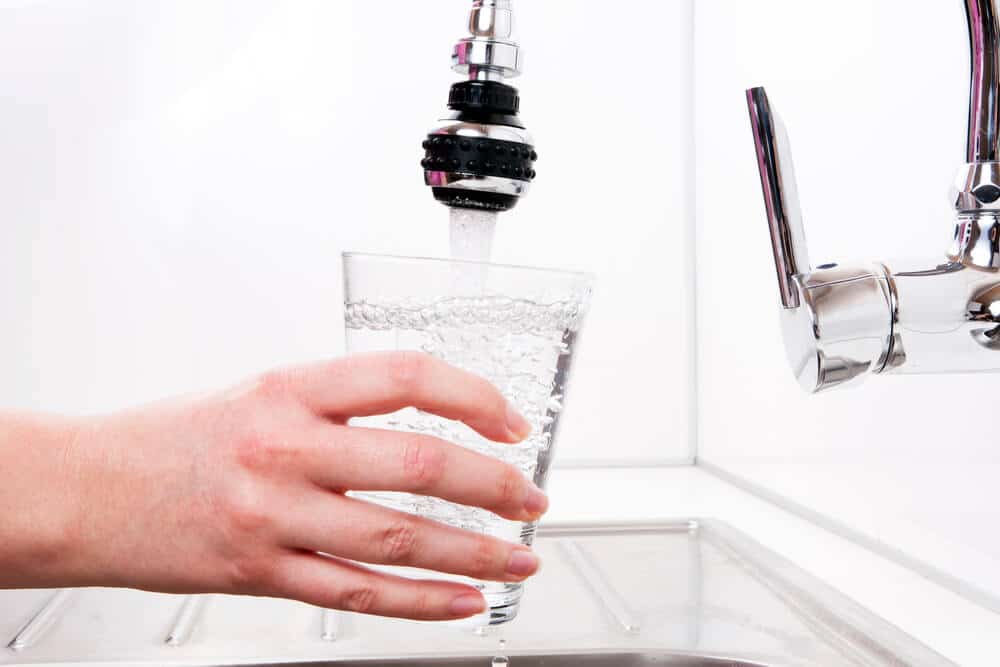
NATURAL SPRING WATER
Spring water is, simply put, the same as tap water. It may be labeled as natural spring water but it’s still just city water (even if it’s from a different city or state than where you may live). Great marketing may say “Bottled Directly” but it’s still coming out of a tap.
Think about it – where does your city water come from? The water we drink from the tap comes from “the rivers and the lakes that you’re used to” and groundwater. Beware of water marked as 100% natural spring water. You might as well go pour yourself a glass of tap water from your own sink.
Brands like Aquafina, Ozarka, Ice Mountain, and Poland Spring (owned by Nestlé) boast “100% natural spring water” on their labels. Nestlé Pure comes straight from a local water source as well.

PUBLIC WATER SOURCE
Another thing to look for on the label of bottled water packaging is “PWS”, which means Public Water Source or, in layman’s terms, tap water in a bottle. Aquafina, owned by PepsiCo, has “PWS” on its label.
BOTTLED WATER REGULATIONS
Keep in mind, that all bottled water on the shelves must meet FDA requirements. However, certification for bottled water is not provided by the FDA or by the EPA either. There are companies who literally take local municipal city water, bottle it up, place a nice label on it, and sell it in the stores. Can we see that the regulations are not as tight on water quality as one would think they should be?
WHAT ABOUT THE CHEMICALS FROM THE PLASTIC BOTTLES THE WATER IS IN?
According to Tasting Table, there was a study completed in 2018 of 259 different types of bottled water. The research showed contamination from microplastic synthetic polymer particles in 93% of those in the study. And while you can purchase water in glass bottles, the cost can be prohibitive.
NOW THAT YOU KNOW WHAT TO LOOK FOR WITH BOTTLED WATER, IS THERE A BETTER OPTION? AND WHAT ABOUT ALKALINE WATER AT HOME? GLAD YOU ASKED!
Did you know you can get reverse osmosis water with a small system that fits right under your kitchen sink and creates bottled water quality (or better) water right at your tap? Not only can you have as much delicious, pure water with a crisp and clean taste at your home as you want, whenever you want, but you can also save money in the long run and skip worrying about whether the water comes in BPA free plastic bottles, BPA free bottles in general, or recycled plastic.
Your local water dealer, Clean Water of Virginia, can come to your home or business to provide a free water test, walk you through the filtration process, present all of your options, answer any questions you may have, install, and maintain your drinking water system for you. They can also test the pH level of your water and recommend whether you could use an alkaline water system to bring your pH level up to the desired level for drinking.
Most water treatment dealers also have alkaline solutions available, so you can add a post RO alkaline filter or an ultraviolet light (if it makes sense for you). To learn more about the options we have, click here.If you’d like to see what the known contaminants are in the Winchester area, click here.
